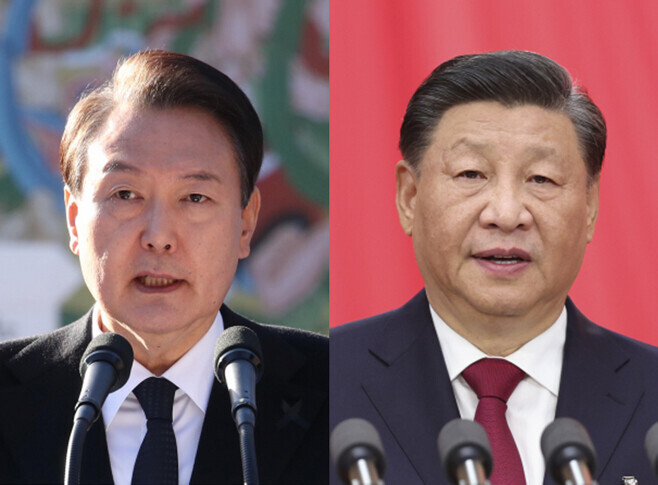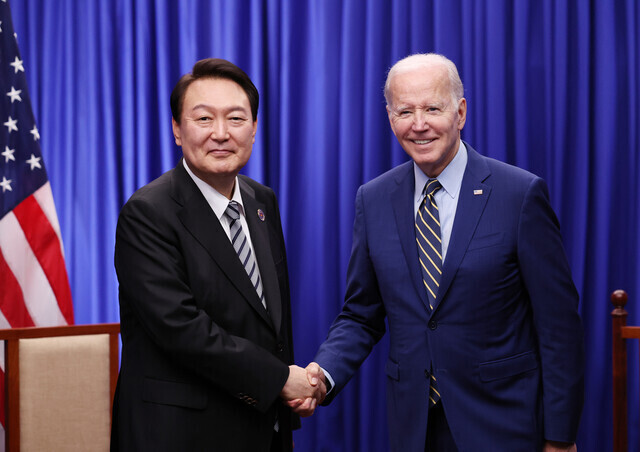hankyoreh
Links to other country sites 다른 나라 사이트 링크
Yoon’s unbalanced diplomacy ignites fury in Beijing

In the days since its release, President Yoon Suk-yeol’s interview with Reuters has garnered considerable controversy, particularly in regard to South Korea’s stance on Taiwan.
In the interview, Yoon remarked that Korea “absolutely oppose[s]” attempts to change the status quo by force, and that the Taiwan issue “is not simply an issue between China and Taiwan but, like the issue of North Korea, it is a global issue.\"
In response, the vice foreign minister has expressed concern and strong dissatisfaction, calling the comments “totally unacceptable.”
Chinese state media blasts Yoon’s comments: “South Korean diplomacy ‘in tatters’”The Chinese Foreign Ministry released a statement on Weibo on Sunday at 1:27 am, saying that Sun “took orders” and lodged a stern protest of Yoon’s comments with South Korean Ambassador to China Chung Jae-ho on Thursday.
The phrase “took orders” makes it clear that this protest was directed by top authorities in the Chinese government.
On Thursday, the day after Yoon’s comments went public, Beijing stated, through Foreign Ministry spokesperson Wang Wenbin, that the resolution of the Taiwan question “is a matter for the Chinese, who do not need to be told what should or should not be done.”
While naming no names, on Friday, Foreign Minister Qin Gang upped the ante by stating, “Those who play with fire on Taiwan will eventually get themselves burned.”
The statements were followed by a release of additional materials at unusual times. Chinese state media, such as the Global Times, published an op-ed titled “South Korean diplomacy’s ‘national dignity’ in tatters over Taiwan remarks” at the top of their front page, noting, “Had it not been for this incident,” referring to Yoon’s remarks in the Reuters interview, “we would not have known how far South Korea’s misconceptions about the Taiwan question had gone.”
China’s repeated criticism of South Korea is likely due to its perception that Yoon’s remarks, which came at a sensitive time, seeing that the South Korea-US summit is on the horizon, crossed a red line on the Taiwan issue. There are two criticisms that can be made.

First, as a diplomatic novice, Yoon’s comments were exceedingly crude. The first time South Korea mentioned the Taiwan issue, a highly sensitive issue for China, in an official document, was during the May 2021 South Korea-US summit. In a joint statement with Joe Biden, President Moon Jae-in “emphasize[d] the importance of preserving peace and stability in the Taiwan Strait.”
This was a gesture of respect to the US, which places a high priority on the Taiwan issue, but Choi Jong-kun, South Korea’s vice foreign minister at the time, immediately said the document “included general statements” in order to quell complaints from China in advance.
However, this time, Yoon stated outright that South Korea “absolutely oppose[s]” any “attempts to change the status quo by force“ — a first-of-its-kind declaration from Seoul, far more forceful than previous statements.
What rankled China more was Yoon’s comparison of the Taiwan issue, a “core interest” that cannot be conceded, to that of North Korea. It was a risky statement that could be misconstrued as a rejection of the “one-China” principle, the basic premise of diplomatic relations between South Korea and China that began in 1992.
While the US and Japanese leaders have been tough on China when it comes to the Taiwan issue, they have been careful to clarify that they respect the one-China principle to avoid misunderstandings. China’s Foreign Ministry directly addressed the issue in a release on Sunday, pointing out that the South Korean leader did not mention anything about the one-China principle.
But the root cause of China\'s unusual outburst appears to be the US-biased diplomacy that has become increasingly apparent since Yoon took office. The \"three-noes” policy of Moon Jae-in —no additional THAAD deployments, no participation in the US missile defense network, and no trilateral military alliance with the US and Japan — that stabilized South Korea-China relations has basically started to unravel.
On April 14, South Korea, the US and Japan held a Defense Trilateral Talk in Washington and regularized missile defense and anti-submarine warfare drills. The South Korean government has signaled its intent to use the upcoming South Korea-US summit as an opportunity to expand and strengthen the trilateral information-sharing system or to create a new system.
The direction the Yoon administration is heading in is clear. It wants to abandon the balanced diplomacy between the US and China that was the foundation of South Korea’s prosperity over the three decades since the end of the Cold War, in favor of containment of China through a trilateral South Korea-US-Japan alliance.
A Chinese source in Beijing stated, “China sees this as a sign that South Korea has become more aligned with the US, and it will probably wait to see the outcome of the upcoming South Korea-US summit before making a concrete response.”
By Choi Hyun-june, Beijing correspondent
Please direct questions or comments to [english@hani.co.kr]

Editorial・opinion
![[Guest essay] Preventing Korean Peninsula from becoming front line of new cold war [Guest essay] Preventing Korean Peninsula from becoming front line of new cold war](https://flexible.img.hani.co.kr/flexible/normal/500/300/imgdb/original/2024/0507/7217150679227807.jpg) [Guest essay] Preventing Korean Peninsula from becoming front line of new cold war
[Guest essay] Preventing Korean Peninsula from becoming front line of new cold war![[Column] The state is back — but is it in business? [Column] The state is back — but is it in business?](https://flexible.img.hani.co.kr/flexible/normal/500/300/imgdb/original/2024/0506/8217149564092725.jpg) [Column] The state is back — but is it in business?
[Column] The state is back — but is it in business?- [Column] Life on our Trisolaris
- [Editorial] Penalties for airing allegations against Korea’s first lady endanger free press
- [Editorial] Yoon must halt procurement of SM-3 interceptor missiles
- [Guest essay] Maybe Korea’s rapid population decline is an opportunity, not a crisis
- [Column] Can Yoon steer diplomacy with Russia, China back on track?
- [Column] Season 2 of special prosecutor probe may be coming to Korea soon
- [Column] Park Geun-hye déjà vu in Yoon Suk-yeol
- [Editorial] New weight of N. Korea’s nuclear threats makes dialogue all the more urgent
Most viewed articles
- 1Behind-the-times gender change regulations leave trans Koreans in the lurch
- 2Yoon’s revival of civil affairs senior secretary criticized as shield against judicial scrutiny
- 3Family that exposed military cover-up of loved one’s death reflect on Marine’s death
- 4Japan says its directives were aimed at increasing Line’s security, not pushing Naver buyout
- 5Unexpected rate of AI development requires timely discussion of side effects
- 6[Guest essay] Preventing Korean Peninsula from becoming front line of new cold war
- 7A breath of fresh air: Innovative architecture in the time of COVID-19
- 8S. Korean first lady likely to face questioning by prosecutors over Dior handbag scandal
- 9Marines who survived flood that killed colleague urge president to OK special counsel probe
- 10Is Japan about to snatch control of Line messenger from Korea’s Naver?